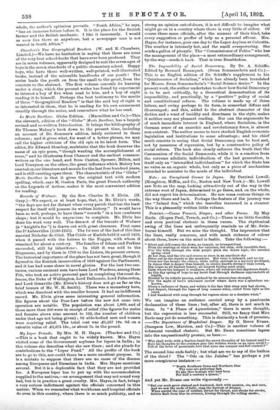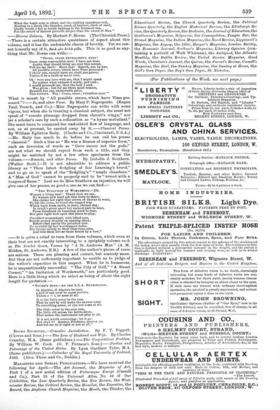Porrav. — Cosmo Venucci, Singer; and other Poems. By May Earle. (Kegan
Paul, Trench, and Co.)—There is no little forcible and even poetical rhetoric in these verses. The rhythmical swing of the lines not =frequently reminds us of Mr. Swin- burne himself. But we miss the thought. The impression that the lines, really sonorous, and with much richness of colour about them, leave on the mind is feeble. Take the following :— "Silent and still comes tho dawn, no tumult, no trampet-biast From the warring of winds wins her entrance, but calm, with inaudible feet, O'er the hills, through the wide purple plain she draws nigh; the narcissi At her ft:wp,ecand the iris and crocus as stars in an amethyst ski
Shine out as she stands in the meadows. Her voice is unheard and no cry From her lips breaks the silence, while softly, enwrapt in a mystery profound, In repose that is deeper than tumult, in silence known strong.r than sound, She comes as all highest beauty, all deepest feeling must come, Calm where the tempest is weakness, where all words are but impotence dumb ; As this day-spring of hope to my heart that through darkness approacheth at length, Hushed by its infinite passion, subdued by its measureless strength. O'er the sight of love's uttermost sorrow where dawn was a splendour un- known Shone a un- known, of flame, and within it the face that sleep only had shown, And despair, through the lapse of long seasons when, exiled from light as the blind, I had wandered with song through far regions alone as a desolate wind."
We can imagine an audience carried away by a passionate declamation of these lines ; but, after all, there is not much in them. In "A Phase of Agnosticism," there is more thought, but the expression is less successful. Still, we fancy that Miss Earle may yet do something. This is distinctly a book of promise. —The Repentance of Magdalene Despar. By G. Essex Evans. (Sampson Low, Marston, and Co.)—This is another volume of vehement versified rhetoric. But Mr. Essex sometimes lapses into the unquestionably prosaic, as here :—
"Who shall write with a fearless hand the secret thoughts of his inmost soul ?— Bare his thoughts to the common gaze like written words on an open scroll ?— Tell of the fever of passionate love that none can conquer and few control P"
The second line ends feebly ; but what are we to say of the bathos of the third ? The "Ode on the Jubilee" has perhaps a yet more conspicuous instance :—
"'Beath Southern Cross and Northern Star Thy sons are gathering fast To pay thee homage who hart been For half a century a Queen."
And yet Mr. Evans can write vigorously :—
" But our souls grow stained and deadened, dark with passion, sin, and care, And we sow the seeds of folly, reap the harvest of despair,
When amidst the roar of combat, thrust for thrust, and stroke for stroke, Sabres flash from blue to crimson, hissing through the rolling smoke ;
When the bugle note is silent, and the rushing squadrons reel, Meeting in a shock like thunder, crash of harness, clash of steel, Gladly would I fall in battle fighting in the foremost van, For the sword of Sorrow merceth deeper than the sword of Man."
—Diversi Colores. By Herbert P. Horne. (The Chiswick Press.) —There is a certain attractive quaintness of aspect about this volume, and it has the undeniable charm of brevity. Yet we can- not honestly say of it, *LA lAv axv, po3a. This is as good as any- thing that Mr. Horne can write :— "csaing, CEASE REPROACHFUL EYES!
Cease, cease reproachful eyes! I have not done Aught, that should bring me ever this unrest. Tell me my fault ! Have end ! Search, one by one, All possible errors, which have Time possessed : I swear you, naught upon me shall you prove; Unless it be a fault in me to love.
Oh! were you here with me, that I might speak No matter what anheed-d words, and vain ; I would persuade me, that the look I seek Was given : but for me there must remain, Beneath the one, unalterable guise, This torture. Nay ! Cease, cease ; relentless eyes!"
What is meant by "All possible errors, which have Time pos- sessed "?—/O, and other Verse. By Mary P. Negroponte. (Regan Paul, Trench, and Co.)—Miss Negropente can write with some vigour, but when she is treating a classical subject, she must not speak of "roseate plumage dropped from cherub's wings," nor jar a scholar's ears by such a collocation as "a hymn matulinal." She must learn to command her undoubted flow of language, and not, as at present, be carried away by it.—Classical Poems. By William Eglinton Baily. (Clarke and Co., Cincinnati, U.S.A.) —Mr. Bally has much to do before he can call his poems "classical." Such a line as "He was a Roman of superior form," such an inversion of words as "Gave succor not the gods," are not what we should expect from such a title, and they might be matched by not a few other specimens from the volume.—Sonnets, and other Poems. By Isabella J. Southern. (Walter Scott.)—It is not admissible to address a public library as "Thou latest fledgling of fair Learning's brood," and to go on to speak of the "fledgling's" "ample chambers." A "Man of God" cannot be properly said to be" armed with a tongue of flame." Lest we do Miss Southern an injustice, we will give one of her poems, as good a one as we can find :— "THE EVOLUTION OF WOXANNOOD.—M.
Woman a living soul ! Thank God, we say,
No woman now need ask that boon to share ; She claims her right that crown of thorns to wear, To lift the cross, to tread the rugged way Which leads from earth, to pure, eternal day; In truth's great quest her earnest part to bear, From falsehood its beguiling mask to tear, Her part right well upon this plane to play.
Unsullied womanhood, with lifted eyes, Stands gazing steadily on opening skies ; Before that purity the proudest bow. No scornful lip her worshippers defies, She listens calmly to their clam'rons cries,
And bids them live as those bound by a vow."
—It is quite a relief to turn from these volumes, which even at their best are not exactly interesting, to a sprightly volume such as The Scarlet Gown, Verses by "A St. Andrews Man" (A. M. Holden, St. Andrews, N.B.) A few of the author's pieces of verse are serious. These are pleasing and correct, but scarcely more. But they are not sufficiently important to enable us to judge of the writer's capacities in this respect. When he is humorous, he is unquestionably successful. "The City of Golf," "A Street Corner," "An Imitation of Wordsworth," are particularly good. Here is a little thing which we select as being of about the right length for quotation :—
" VIVIEN'S SONG.—AT THE L.L.A. EIAXINATION.
In Algebra, if Algebra be ours, re and igs can ne'er be equal powers, Unless x = 1, or none at all.
It is the little error in the sum, That by and by will make the answer come To something queer, or else not come at all.
The little error in the easy sum,
The little slit across the kettle-drum, That makes the instrument not play at all.
It is not worth correcting : let it go : But shall IT Answer, Prudence, answer, no. And bid me do it right or not at all."

































 Previous page
Previous page